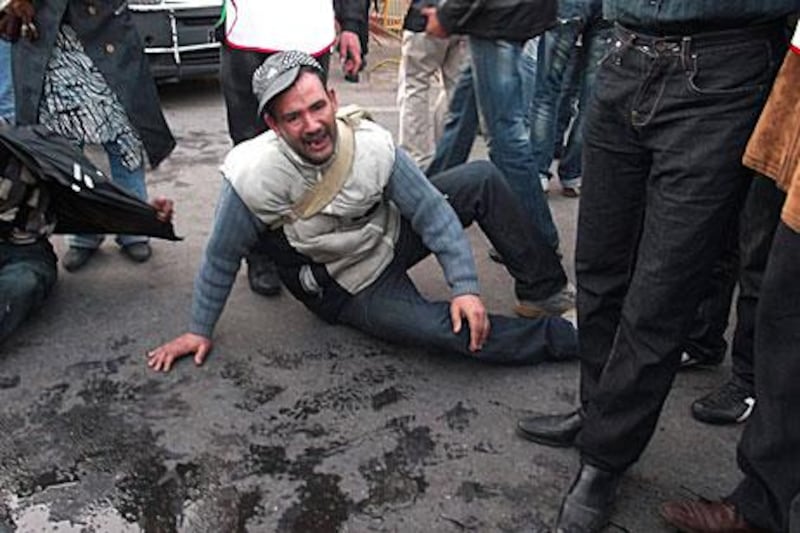TUNIS // Five protesters who set fire to themselves this week in the Moroccan capital are the latest examples of an apparently growing trend in self-immolation among North Africa's poor, frustrated and dispossessed.
The practice burst into headlines in December 2010 when a Tunisian produce vendor, Mohamed Bouazizi, set himself alight in outrage at years of harassment by officials in his provincial hometown.
A month later, protests sparked by Bouazizi's fatal gesture helped unseat Tunisia's autocratic president, Zine el Abidine Ben Ali. A subsequent wave of uprisings across the Arab world has brought down dictators in Egypt and Libya and threatens leaders elsewhere.
Meanwhile, news reports over the past year suggest that North African protesters have turned increasingly to Bouazizi's example to make their grievances known.
The self-immolations in Rabat on Wednesday had their root in a well-worn campaign by jobless university graduates to demand public sector jobs. As in other North African countries, recent economic growth has failed to bring down high youth unemployment.
The "diplômés chômeurs", as the graduates are known in French, are a common sight in Rabat. Wearing matching coloured smocks, they protest outside the parliament building, occasionally block traffic and are sometimes dispersed by police.
Two weeks ago, dozens of diplômés chômeurs began occupying an Education Ministry building, which police blockaded to prevent supporters from bringing in food, said Youssef Raissouni, head of the Rabat chapter of the Moroccan Association for Human Rights (AMDH).
Four or five days ago, authorities cut off water and electricity to the building, Mr Raissouni said. On Wednesday evening, additional protesters massed outside.
A video uploaded to YouTube apparently by activists from the February 8 Group of Hope purports to show part of what happened next: a flash of light, screams, and at least one burning figure staggering towards the camera as onlookers flee and supporters beat out the flames.
Protesters Abdelouahab Zeidoun and Mahmoud Haouassi were badly burnt and taken to hospital in Casablanca, while two fellow diplômés chômeurs and a member of the pro-reform February 20 Movement suffered light burns, Mr Raissouni said.
Another video apparently shows one of the burnt men reeling from his injuries, repeatedly intoning the words, "There is no God but God" as blistered skin peels from his bare arms and chest. It remains unclear exactly how the men ignited themselves.
While the self-immolations have startled Morocco, they are not the first, Mr Raissouni said. "There have been multiple cases already, including before Bouazizi."
A diplômé chômeur briefly set himself alight in Rabat in June 2010 before people standing near him smothered the flames.
News reports across North Africa indicate a trend in self-immolations since Bouazizi died of his burns in January 2011. From Mauritania to Tunisia, a common thread emerges of ordinary people frustrated by authorities they say are abusive, negligent, or both.
At least 25 Algerians tried to set themselves alight in a single week in January 2011, according to France's Le Figaro newspaper. Some were denied state housing amid a chronic housing shortage, others were Algerian illegal migrants turned back at sea by their country's coastguard.
Last month a 25-year-old Algerian man set fire to himself after police in the desert town of Ouargla allegedly refused to accept his complaint about a stolen motorbike, according to Agence France-Presse.
Last August Moroccan street vendor Hamid El Kanouni, 27, fatally burnt himself in the town of Berkane, near the Algerian border, after police seized his cart, in a case eerily similar to that of Bouazizi, according to Moroccan news website Lakome.com.
Four people set fire to themselves in a single week this month in Tunisia, reported the Associated Press, with two dying from their burns including 48-year-old Ammar Gharsalla, an unemployed father of three.
Governments across North Africa have vowed to fight unemployment. Morocco's King Mohammed VI last year also offered modest constitutional reforms to appease protesters, while Tunisia has gone from police state to emerging democracy with Ben Ali's departure.
jthorne@thenational.ae
Self-immolation attempts shock Morocco
News reports suggest that North African protesters have turned increasingly to self-immolation to make their grievances known.

Editor's picks
More from the national




